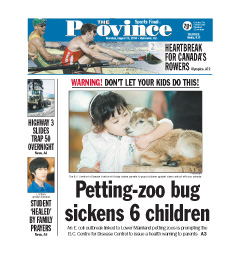Animal Advocates Watchdog
THE PROVINCE
Latest News
Matthew Ramsey
The Province
Thursday, August 19, 2004
A health warning to parents was to be issued today after six cases of potentially deadly E. coli illness in children were linked to two Lower Mainland petting zoos.
Sally Greenwood of the B.C. Centre for Disease Control said the centre has records of two "clusters" of E. coli illness in children who visited a petting zoo in North Vancouver and another in Abbotsford since July.
Greenwood said petting-zoo animals can have feces in their fur from lying in their droppings, and that feces can contain the E. coli bacteria.
It is believed the infections may have come from children rubbing their faces into the fur or petting the animals and not washing their hands afterward.
"There's always a risk of E. coli and salmonella in a petting-zoo situation," Greenwood said.
Four children became ill with suspected E. coli infection after visiting the North Vancouver farm in early July. Two others became sick after spending time at the Abbotsford Agrifair zoo in early August.
The four North Vancouver cases were not serious, Greenwood said. The condition of the two young Aldergrove sisters -- whose illnesses may be related to the Agrifair -- was not known yesterday.
The Centre for Disease Control and the Kidney Foundation are expected to issue an advisory to the public today.
David Vawter, executive director of the Kidney Foundation, said the notice may scare parents, but it's important to make the information public considering the potentially deadly results of an E. coli infection.
"With E. coli and with children, the potential for kidney failure is very high," he said.
"The potential is there, but I think if you wash your hands with soap and hot water, the chance [of infection] is almost zero."
E. coli bacteria produce a toxin that can damage the kidneys, other organs and red blood cells. In 10 per cent of children infected, E. coli can lead to Hemolytic Uremic Syndrome, which can cause kidney failure and death.
Symptoms of infection include diarrhea (often bloody), abdominal cramps, fever and vomiting.
Across B.C., 59 people, including the six children, have contracted E. coli illness this year. The majority of those cases are not related.
Provincial Medical Health Officer Dr. John Blatherwick said there is no reason for parents to be afraid of taking their kids to petting zoos and he doesn't believe the facilities should be shut down.
"Petting zoos are safe, petting zoos should be encouraged, but wash your hands -- that's the message," Blatherwick said.
"There's a whole bunch of things you can get diseases from that you don't shut down."
Both Blatherwick and Agrifair general manager Harvey Carroll stressed that the sisters who got sick after petting farm animals in Abbotsford may have contracted the infection elsewhere, or there may have been transmission from one to the other.
However, the possibility that E. coli from the animals is to blame can't be discounted, Carroll said.
"I guess when you've got animals, there's always the possibility," Carroll said, noting that Fraser Health Authority officials inspected the Agrifair petting zoo before it opened to the public July 29 and gave it the seal of approval.
The Agrifair zoo offered patrons a large handwashing area and another unit with four sinks.
Carroll said the petting zoo will take whatever precautions it can to try to ensure nobody gets sick from petting the animals, but there is a limit to what can be done.
"How do you force people to wash their hands?" he said.
DISEASE-CONTROL ADVISORY NOTICE
Today's B.C. Centre for Disease Control advisory notice will stress:
- The need for parents to ensure their children wash their hands thoroughly on their trips to petting farms;
- Keep children's hands out of their mouths after petting animals;
- Dissuade kids from rubbing their faces on the animals;
- Try to prevent children from kissing the animals, since petting-zoo animals may have feces in their fur.
© The Vancouver Province 2004
